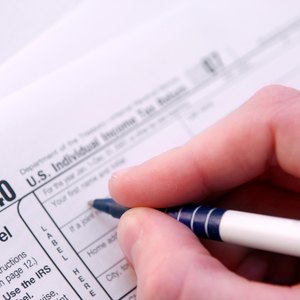
You can often collect unemployment while you look for a new job if the business you work for goes under or has to downsize and cut back. This money is a form of insurance that businesses pay for in order to compensate former employees if they're terminated due to reasons outside of their control.
These payments can be very helpful, but 37 percent of unemployment compensation recipients didn't know that their unemployment benefits were taxable income, according to MarketWatch in 2020.
Unemployment Is Taxable
Unemployment compensation is considered income and it's therefore taxable, according to the Internal Revenue Service. Tax year 2020 was a rare exception to this rule for taxpayers with modified adjusted gross incomes of less than $150,000. They were able to exclude up to $10,200 of their unemployment benefits from taxation, a step taken by the federal government in response to the COVID-19 pandemic. But that tax provision has not been renewed for tax year 2021, the return you'd file in 2022.
The pivotal date is the one when you actually receive the benefits. You might receive unemployment compensation in January 2021 that accrued for time you were out of work in December 2020. These benefits are taxable as 2021 income, not 2020 income, and they must be reported on your 2021 return because that's the year in which you received the money.
Most states allow workers who are collecting unemployment to have income tax withheld from their payments, just as taxes are withheld from paychecks. But you should make estimated quarterly tax payments to the IRS if you're not able to take advantage of this.
Options for Paying Taxes
States that offer to withhold taxes can only do so at a flat, fixed rate of 10 percent according to federal law. This could be just a drop in the bucket if your top tax bracket for the year is 22 percent. You could still end up owing the IRS at tax time if you only had 10 percent withheld from your benefits.
You can avoid this by calculating the top tax rate you would have to pay, such as 22 percent of your benefits, and paying this amount to the IRS quarterly as estimated tax payments. The estimated quarterly tax dates are April 15 for income earned from Jan. 1 through March 31, then June 15 for income earned between April 1 and May 31, Sept. 15 for income earned June 1 through Aug. 31, and Jan. 15 of the following year for income earned from Sept. 1 through Dec. 31.
How to Claim Unemployment on Your Return
Your state's unemployment office should send you a tax form for your earnings after the close of the tax year, usually sometime in January. This form is the 1099-G and it should show in box 1 the amount of unemployment compensation you collected the previous year. The taxes that were withheld from your unemployment benefits, if any, should appear in box 2. These figures should be entered on lines 1 and 25a of your Form 1040 tax return.
Including this information is easy if you use tax preparation software. You can tell the program that you have a 1099-G tax form and it will walk you through the process of entering that information and applying it to the correct areas on your tax return.
Penalties for Not Claiming
You can be charged a penalty for not paying taxes on your benefits if you opt not to have the state do withholding for you and you don't send in quarterly tax payments. You'll also be forced to pay taxes on the entire amount when you file your tax return in addition to late fees and interest.
You could owe taxes on $12,000 if you collected $2,000 a month in unemployment for six months at a 10 percent tax rate. This could mean a tax bill of $1,200, or it could take a bite out of any refund you might have been expecting to receive from refundable tax credits, such as the Earned Income Tax Credit. It could be even more if your top earnings fall into the12-percent, 22-percent or even higher tax bracket. It's highly suggested that you allow the state to set up withholding from your unemployment benefits.
References
- Market Watch: Are You Receiving Unemployment? Read This Before Filing Your Taxes
- IRS: Unemployment Compensation Is Taxable; Have Tax Withheld Now and Avoid a Tax-Time Surprise
- IRS: When to Pay Estimated Tax
- IRS: 2020 Unemployment Compensation Exclusion FAQs – Topic A Eligibility
- State of New Jersey Department of Labor and Workforce Development: Federal Income Taxes on Unemployment Insurance Benefits
- IRS: Form W-2 Wage and Tax Statement
- IRS: Form 1040 Individual Income Tax Return
- IRS: People Should Have Tax Withheld From Unemployment Now to Avoid a Tax-Time Surprise
Writer Bio
K.A. Francis has been a freelance and small business owner for 20 years. She has been writing about personal finance and budgeting since 2008. She taught Accounting, Management, Marketing and Business Law at WV Business College and Belmont College and holds a BA and an MAED in Education and Training.
